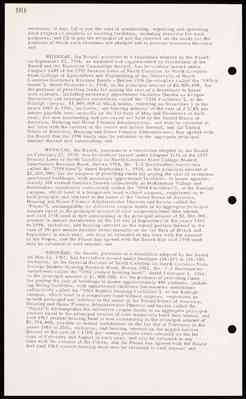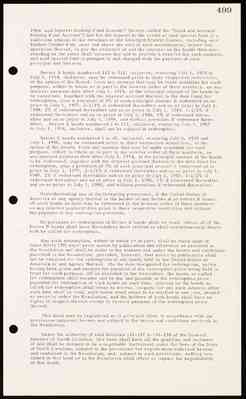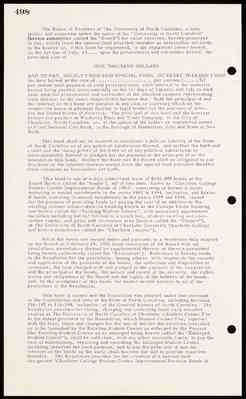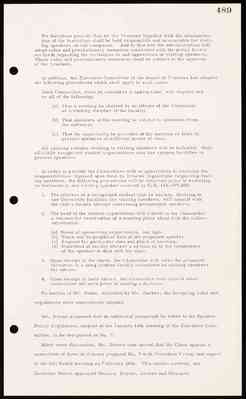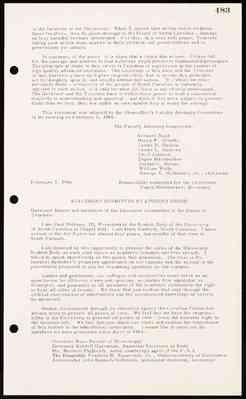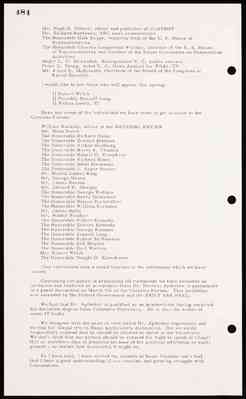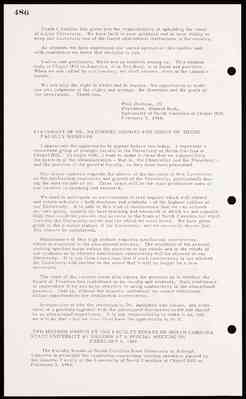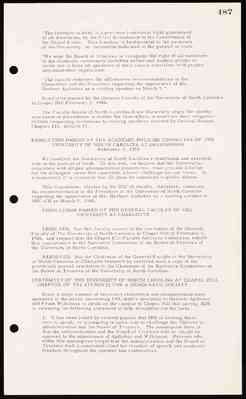Pages That Need Review
Volume 09: June 17, 1964–February 28, 1966
revenues, if any, (a) to pay the cost of maintaining, repairing and operating such project or projects or existing facilities, including reserves for such purposes, and (b) to pay the principal of and the interest on the bonds for the payment of which such revenues are pledged and to provide reserves therefor; and
WHEREAS, the Board, pursuant to a resolution adopted by the Board on September 22, 1956, as amended and supplemented by resolutions of the Board and the Executive Committee thereof, has heretofore issued under Chapter 1289 of the 1955 Session Laws of North Carolina its North Carolina State College of Agriculture and Engineering of the University of North Carolina Dormitory Revenue Bonds - Series 1956 (hereinafter called the "1956 b bonds"), dated November 1, 1956, in the principal amount of $2,000,000, for the purpose of providing funds for paying the cost of a dormitory to house men students, including necessary appurtenant facilities (known as Bragaw Dormitory and hereinafter sometimes called the "1956 Facilities"), at the Raleigh campus, $1, 804, 000 of which bonds, maturing on November 1 in the years 1965 to 1996, inclusive, and bearing interest at the rate of 2 3/4% per annum payable semi-annually on the 1st days of May and November in each year, are now outstanding and are owned and held by the United States of America, Housing and Home Finance Administrator, and may be refunded at any time with the consent of the owner and holder thereof, and the United States of America, Housing and Home Finance Administrator, has agreed with the Board that the 1956 bonds may be refunded in the aggregate principal amount thereof now outstanding; and
WHEREAS, the Board, pursuant to a resolution adopted by the Board on February 23, 1959, has heretofore issued under Chapter 1131 of the 1957 Session Laws of North Carolina its North Carolina State College Student Apartments Revenue Bond, Series 1958, No. T-l (hereinafter sometimes called the "1958 bond"), dated September 1, 1958, in the principal amount of $2,200,000, for the purpose of providing funds for paying the cost of seventeen apartment buildings, with necessary appurtenant facilities, to house approximately 300 student families (known collectively as McKimmon Village and hereinafter sometimes collectively called the "1958 Facilities"), at the Raleigh campus, which bond is a temporary bond without coupons, registered as to both principal and interest in the name of the United States of America, Housing and Home Finance Administrator (therein and herein called the "Payee"), exchangeable for definitive coupon bonds in an aggregate principal amount equal to the principal amount of said temporary bond then unpaid, and said 1958 bond is now outstanding in the principal amount of $2,066,000, payable in annual instalments on the 1st day of September in the years 1965 to 1998, inclusive, and bearing interest on the unpaid portion thereof at the rate of 3% per annum payable semi-annually on the 1st days of March and September in each year, and may be refunded at any time with the consent of the Payee, and the Payee has agreed with the Board that said 1958 bond may be refunded in said amount; and
WHEREAS, the Board, pursuant to a resolution adopted by the Board on May 22, 1961, has heretofore issued under Sections 116-175 to 116-185 inclusive, of the General Statutes of North Carolina its North Carolina State College Student Housing Revenue Bond, Series 1961, No. T-l (hereinafter sometimes called the "1961 student housing bond", dated February 1 1961, in the principal amount of $1,800,000, for the purpose of providing funds for paying the cost of buildings to house approximately 480 students, including dining facilities, with appurtenant facilities (hereinafter sometimes collectively called the "1961 Student Housing Facilities"), at the Raleigh campus, which bond is a temporary bond without coupons, registered as to both principal and interest in the name of the United States of America, Housing and Home Finance Administrator (therein and herein called the "Payee" ); exchangeable for definitive coupon bonds in an aggregate principal amount equal to the principal amount of said temporary bond then unpaid, and said 1961 student housing bond is now outstanding in the principal amount of $1,774,000, payable in annual instalments on the 1st day of February in the years 1965 to 2001, inclusive, and bearing interest on the unpaid portion thereof at the rate of 3 1/8% per annum payable semi-annually on the 1st days of February and August in each year, and may be refunded at any time with the consent of the Payee, and the Payee has agreed with the Board that said 1961 student housing bond may be refunded in said amount; and
499
1964 and Interest Sinking Fund Account" (herein called the "Bond and Interest Sinking Fund Account") and for the deposit to the credit of said special fund of a sufficient amount of the revenues of the Enlarged Student Center, including said Student Center Fee, over and above the cost of such maintenance, repair and operation thereof, to pay the principal of and the interest on the bonds then outstanding as the same shall become due and to provide a reserve for such purpose, and said special fund is pledged to and charged with the payment of such principal and interest.
Series A bonds numbered 112 to 512, inclusive, maturing July 1, 1975 to July 1, 1994, inclusive, maybe redeemed prior to their respective maturities, at the option of the Board, from any moneys that may be made available for such purpose, either in whole or in part in the inverse order of their numbers, on any interest payment date after July 1, 1974, at the principal amount of the bonds to be redeemed, together with the interest accrued thereon to the date fixed for redemption, plus a premium of 3% of such principal amount if redeemed on or prior to July 1, 1977, 2-1/2% if redeemed thereafter and on or prior to July 1, 1980, 2% if redeemed thereafter and on or prior to July 1, 1983, 1-1/2% if redeemed thereafter and on or prior to July 1, 1986, 1% if redeemed thereafter and on or prior to July 1, 1989, and without premium if redeemed thereafter. Series A bonds numbered 1 to 111, inclusive, maturing July 1, 1967 to July 1, 1974, inclusive, shall not be subject to redemption.
Series B bonds numbered 1 to 40, inclusive, maturing July 1, 1995 and July 1, 1996, may be redeemed prior to their respective maturities, at the option of the Board, from any moneys that may be made available for such purpose, either in whole or in part in the inverse order of their numbers, on any interest payment date after July 1, 1974, at the principal amount of the bonds to be redeemed, together with the interest accrued thereon to the date fixed for redemption, plus a premium of 3% of such principal amount if redeemed on or prior to July 1, 1977, 2-1/2% if redeemed thereafter and on or prior to July 1, 1980, 2% if redeemed thereafter and on or prior to July 1, 1983, 1-1/2% if redeemed thereafter and on or prior to July 1, 1986, 1% if redeemed thereafter and on or prior to July 1, 1989, and without premium if redeemed thereafter.
Notwithstanding any of the foregoing provisions, if the United States of America or any agency thereof is the holder of any Series A or Series B bonds, all such bonds so held may be redeemed in the inverse order of their numbers on any interest payment date prior to their respective maturities and without the payment of any redemption premium.
No purchase or redemption of Series A bonds shall be made unless all of the Series B bonds shall have theretofore been retired or shall simultaneously therewith be called for redemption.
Any such redemption, either in whole or in part, shall be made upon at least thirty (30) days' prior notice by publication and otherwise as provided in the Resolution and shall be made in the manner and under the terms and conditions provided in the Resolution; provided, however, that notice by publication shall not be required for the redemption of any bonds held by the United States of America or any agency thereof. On the date designated for redemption, notice having been given and moneys for payment of the redemption price being held in trust for such purpose, all as provided in the Resolution, the bonds so called for redemption shall become and be due and payable at the redemption price provided for redemption of such bonds on such date, interest on the bonds so called for redemption shall cease to accrue, coupons for any such interest after such date shall be void, such bonds shall cease to be entitled to any lien, benefit or security under the Resolution, and the holders of such bonds shall have no rights in respect thereof except to receive payment of the redemption price thereof.
This bond may be registered as to principal alone in accordance with the provisions endorsed hereon and subject to the terms and conditions set forth in the Resolution.
Under the authority of said Sections 116-187 to 116-198 of the General Statutes of North Carolina, this bond shall have all the qualities and incidents of and shall be deemed to be a negotiable instrument under the laws of the State of North Carolina, subject to the provisions for registration endorsed hereon and contained in the Resolution, and, subject to such provisions, nothing contained in this bond or in the Resolution shall affect or impair the negotiability of this Bond.
498
The Board of Trustees of The University of North Carolina, a body politic and corporate under the name of the "University of North Carolina" (herein sometimes called the "Board") for value received, hereby promises to pay, solely from the special fund provided therefor as hereinafter set forth, to the bearer or, if this bond be registered, to the registered owner hereof, on the 1st day of July, 19. . . , upon the presentation and surrender hereof, the principal sum of
ONE THOUSAND DOLLARS
AND TO PAY, SOLELY LROM SAID SPECIAL FUND, INTEREST THEREON FROM the date hereof at the rate of . . . . . . . . . . . . . . . . . . . . . per centum ( . . . . . . %) per annum until payment of such principal sum, such interest to the maturity hereof being payable semi-annually on the 1st days of January and July in each year upon the presentation and surrender of the attached coupons representing such interest as the same respectively become due. Both the principal of and the interest on this bond are payable in any coin or currency which on the respective dates of payment thereof is legal tender for the payment of debts due the United States of America. The principal of this bond and the interest hereon are payable at Wachovia Bank and Trust Company, in the City of Charlotte, North Carolina, or, at the option of the holder or registered owner, at First National City Bank, in the Borough of Manhattan, City and State of New York.
This bond shall not be deemed to constitute a debt or liability of the State of North Carolina or of any political subdivision thereof, and neither the faith and credit nor the taxing power of the State or of any political subdivision or instrumentality thereof is pledged for the payment of the principal of or the interest on this bond. Neither the State nor the Board shall be obligated to pay this bond or the interest thereon except from the special fund provided therefor from revenues as hereinafter set forth.
This bond is one of a duly authorized issue of $552,000 bonds of the Board (herein called the "bonds"), all of like date, known as "Charlotte College Student Center Improvement Bonds of 1964", consisting of Series A bonds maturing in annual instalments in the years 1967 to 1994, inclusive, and Series B bonds maturing in annual instalments in the years 1995 and 1996, issued for the purpose of providing funds for paying the cost of an addition to the existing student union-cafeteria building known as the College Union Building and herein called the "Existing Student Center", with necessary appurtenant facilities including but not limited to a snack bar, student meeting and committee rooms, and game and recreation area (herein called the "Project"), at The University of North Carolina at Charlotte (formerly Charlotte College and herein sometimes called the "Charlotte campus").
All of the bonds are issued under and pursuant to a resolution duly adopted by the Board on February 28, 1966 (said resolution of the Board with all resolutions amendatory thereof or supplemental thereto as therein permitted being herein collectively called the "Resolution"). Reference is hereby made to the Resolution for the provisions, among others, with respect to the custody and application of the proceeds of the bonds, the collection and disposition of revenues, the fund charged with and pledged to the payment of the interest on and the principal of the bonds, the nature and extent of the security, the rights, duties and obligations of the Board and the rights of the holders of the bonds, and, by the acceptance of this bond, the holder hereof assents to all of the provisions of the Resolution.
This bond is issued and the Resolution was adopted under and pursuant to the Constitution and laws of the State of North Carolina, including Sections 116-187 to 116-198, inclusive, of the General Statues of North Carolina. The Resolution provides for fixing, charging and collecting from each enrolled student at The University of North Carolina at Charlotte a Student Center Fee to the extent provided in the Resolution, which Student Center Fee, together with the fees, rents and charges for the use of and for the services furnished or to be furnished by the Existing Student Center as enlarged by the Project (the Existing Student Center as so enlarged being herein called the "Enlarged Student Center"), shall be sufficient, with any other available funds, to pay the cost of maintaining, repairing and operating the Enlarged Student Center, including reserves for such purpose, and to pay the principal of and the interest on the bonds as the same shall become due and to provide reserves therefor. The Resolution provides for the creation of a special fund designated "Charlotte College Student Center Improvement Revenue Bonds of
488
2. It has been incorrectly reported that Frank Wilkinson, head of the National Committee to Abolish the House UnAmerican Activities Committee (HUAC), could not have spoken in Chapel H 11 when the speaker ban law was in effect because he had taken the Fifth Amendment. The fact is that he took the First Amendment and only the First Amendment before HUAC.
3. People have questioned our motives in inviting these men to speak. We invited both Wilkinson and Aptheker to speak because these men articulate important stands on basic issues facing our society. We issued the invitations because we believe their presence will generate serious debate and discussion. Both speakers have assured us in writing that they are happy to have questions from the floor following their addresses, in accordance with the well-established academic tradition.
/s/ Roy James McCorkel, Jr. President, UNC-SDS.
The entire problem was discussed at great length. Several motions and resolutions were offered and withdrawn.
Governor Moore stated that he had not attempted to dictate to the Executive Committee and did not expect to. He did, however, reserve the right, as Chairman, to express his views.
President Friday reviewed the situation as he sees it and presented for approval of the Committee certain rules and regulations to govern invitations to visiting speakers who come under the Speaker Ban Bill. They are as follows:
VISITING SPEAKER POLICY
On November 12, 1965 the Board of Trustees adopted the following visiting speaker policy:
The Trustees recognize that this Institution, and every part thereof, is owned by the people of North Carolina; that it is operated by duly selected representatives and personnel for the benefit of the people of our state.
The Trustees of this Institution are unalterably opposed to Communism and any other ideology or form of government which has as its goal the destruction of our basic democratic institutions.
We recognize that the total program of a college or university is committed to an orderly process of inquiry and discussion, ethical and moral excellence, objective instruction, and respect for law. An essential part of the education of each student at this Institution is the opportunity to hear diverse viewpoints expressed by speakers properly invited to the campus. It is highly desirable that students have the opportunity to question, review and discuss the opinions of speakers representing a wide range of viewpoints.
It is vital to our success in supporting our free society against all forms of totalitarianism that institutions remain free to examine these ideologies to any extent that will seve the educational purpose of our institutions and not to the purposes of the enemies of our free society.
We feel that the appearance as a visiting speaker on our campus of one who was prohibited under Chapter 1207 of the 1963 Session Laws (The Speaker Ban Law) or who advocates any ideology or form of government which is wholly alien to our basic democratic institutions should be infrequent and then only when it would clearly serve the advantage of education; and on such rare occasions reasonable and proper care should be exercised by the institution. The campuses shall not be exploited as convenient outlets of discord and strife.
489
We therefore provide that we the Trustees together with the administration of the Institution shall be held responsible and accountable for visiting speakers on our campuses. And to that end the administration will adopt rules and precautionary measures consistent with the policy herein set forth regarding the invitations to and appearance of visiting speakers. These rules and precautionary measures shall be subject to the approval of the Trustees.
In addition, the Executive Committee of the Board of Trustees has adopted the following procedures which shall apply in such cases:
Each Chancellor, when he considers it appropriate, will require any or all of the following: (a) That a meeting be chaired by an officer of the University or a ranking member of the faculty;
(b) That speakers at the meeting be subject to questions from the audience;
(c) That the opportunity be provided at the meeting or later to present speakers of different points of view.
All existing statutes relating to visiting speakers will be followed. Only officially recognized student organizations may use campus facilities to present speakers.
In order to provide the Chancellors with an opportunity to exercise the responsibilities imposed upon them by Trustee regulations respecting visiting speakers, the following procedures will be observed prior to extending an invitation to any visiting speaker covered by G.S. 116-199:200.
1. The officers of a recognized student club or society, desiring to use University facilities for visiting speakers, will consult with the club's faculty advisor concerning prospective speakers.
2. The head of the student organization will submit to the Chancellor a request for reservation of a meeting place along with the follow-information:
(a) Name of sponsoring organization, and topic. (b) Name and biographical data of the proposed speaker. (c) Request for particular data and place of meeting. (d) Statement of faculty adviser's opinion as to the competence of the speaker to deal with his topic.
3. Upon receipt of the above, the Chancellor will refer the proposed invitation to a joing student-faculty committee on visiting speakers for advise.
4. Upon receipt of their advice, the Chancellor may consult other constituted advisers prior to making a decision.
On motion of Mr. Noble, seconded by Mr. Barber, the foregoing rules and regulations were unanimously adopted.
Mr. Bryant proposed that an additional paragraph be added to the Speaker Policy Regulations adopted at the January 14th meeting of the Executive Committee, to be designated as No. 7.
After some discussion, Mr. Bryant then moved that the Chair appoint a committee of three to discuss proposal No. 7 with President Friday and report to the full Board meeting on F ebruary 28th. This motion carried, and Governor Moore appointed Messrs. Bryant, Barber and Maynard.
483
in the faculties of the University. When Trustees take action which weakens these faculties, they do great damage to the future of North Carolina - damage no less harmful because unintended. For this, in a very real sense, Trustees taking such action must answer to their children and grandchildren and to generations yet unborn.
In summary of the above it is plain that a crisis has arisen. Crises fall for the courage and wisdom to find solutions which preserve fundamental principles. The principle at stake in this crisis is freedom of expression in the context of high quality advanced education. The Covernor of this State and the Trustees of this Universi y have no higher responsibility Lhan to accept this principle, act forthrightly upon it, and stoutly defend that action. If - which we most seriously doubt - a majority of the people of North Carolina is currently opposed to such action, it is only because the issue is not clearly understood. The Governor and the Trustees have it within their power to lead a substantial majority to understanding and approval - and even if this were subject to greater doubt than we feel, they are under an inescapable duty to make the attempt.
This statement was adopted by the Chancellor's Faculty Advisory Committee in its meeting on February 6, 1966.
The Faculty Advisory Committee:
Bernard Boyd Henry P. Brandis James R. Gaskin James L. Godfrey Cecil Johnson Eugen Merzbacher Joseph C. Sloane William Wells George E. Nicholson, Jr., chairman
February 7, 1966 Respectfully submitted for the Committee Eugen Merzbacher, Secretary
STATEMENT SUBMITTED BY STUDENT GROUP
Governor Moore and members of the Executive Committee of the Board of Trustees:
I am Paul Dickson, III, President of the Student Body of the University of North Carolina at Chapel Hill. I am from Raeford, North Carolina. I have served in the Air Force for almost four years, ten months of that time in South Vietnam.
I am honored by this opportunity to present the views of the University Student Body on such vital topics as academic freedom and free speech. I which to speak specifically on two points this afternoon. The first is Dr. Herbert Aptheker's proposed appearance on our campus and the second is the procedures proposed to you for regulating speakers on our campus.
Ladies and gentlemen, our colleges and universities must serve as an open forum for different views and opinions, no matter how unpopular or divergent, and guarantee to all members of the academic community the right to hear all sides of issues. We know that you realize that only through the critical examination of alternatives can the accumulated knowledge of society be advanced.
Student Government through its executive agency the Carolina Forum has always tried to present all points of view. We feel that we have the responsibility to the University to present all points of view - from the extreme right to the extreme left. We feel that you share our views and realize the importance of this matter to the educational community. I would like to point out the speakers we have presented since April of 1964:
Governor Ross Barnett of Mississippi Governor Averell Harriman, Assistant Secretary of State Mr. Herbert Philbrick, noted counterspy agent of the F.B.I. The Honorable Franklin D. Roosevelt, Jr. , Undersecretary of Commerce Ambassador John Kenneth Galbraith, prominent diplomat, economist
484
Mr. Hugh H. Hefner, editor and publisher of PLAYBOY Mr. Richard Harkness, NBC news commentator The Honorable Hale Boggs, majority whip of the U. S. House of Representatives The Honorable Charles Longstreet Weltner, member of the U. S. House of Representatives and member of the House Committee on UnAmerican Activities Major L. P. McLendon, distinguished N.C. public servant Peter B. Young, noted N.C. News Analyst for WRAL-TV Mr. Floyd B. McKissick, chairman of the Board of the Congress of Racial Equality.
I would like to list those who will appear this spring: 1) Robert Welch 2) Possibly Russell Long 3) Fulton Lewis, III
Here are some of the individuals we have tried to get to come to the Carolina Forum:
William Buckley, editor of the NATIONAL REVIEW Mr. Dean Burch The Honorable Richard Daley The Honorable Everett Dirksen The Honorable Arthur Goldberg The Honorable Harry S. Truman The Honorable Hubert H. Humphrey The Honorable Richard Nixon The Honorable Adlai Stevenson The Honorable J. Edgar Hoover Dr. Martin Luther King Mr. George Meany Mr. James Reston Mr. Edward P. Morgan The Honorable George Wallace The Honorable Barry Goldwater The Honorable Nelson Rockefeller The Honorable William Scranton Mr. James Hoffa Mr. Walter Reuther The Honorable Robert Kennedy The Honorable Edward Kennedy The Honorable George Romney The Honorable Russell Long The Honorable Robert McNamara The Honorable Bill Moyers The Honorable Earl Warren Mr. Robert Welch The Honorable Dwight D. Eisenhower
This represents only a small fraction of the invitations which we have issued.
Continuing our policy of presenting all viewpoints we have extended an invitation and received an acceptance from Dr. Herbert Aptheker to participate in a panel discussion on March 9th on the Carolina Forum. This invitation was extended by the Student Government and the DAILY TAR HEEL.
We feel that Dr. Aptheker is qualified as an academician having received his doctorate degree from Columbia University. He is also the author of some 17 books.
We disagree with the point of view which Dr. Aptheker represents and we find his illegal trip to Hanoi particularly distasteful. But we would respectfully contend that he should be allowed to speak at the University. We don't think that any person should be refused his right to speak at Chapel Hill or anywhere else in America because of his political affiliation or background - no matter how distasteful it might be.
As I have said, I have served my country in South Vietnam and I feel that I have a good understanding of our constant and growing struggle with Communism.
486
North Carolina has given you the responsibility of upholding the ideas of a free University. We have faith in your guidance and in your ability to keep our University one of the finest educational institutions in the country.
As students we have expressed our united opinion on this matter and with confidence we leave this decision to you.
Ladies and gentlemen, there are no traitors among us. This student body at Chapel Hill is America, it is Tar Heel, it is loyal and patriotic. When we are called by our country, we shall answer, even in the cannon's mouth.
We ask only the right to listen and to inquire, the opportunity to make our own judgment of the rights and wrongs, the direction and the goals of our generation. Thank you.
Paul Dickson, III President, Student Body, University of North Carolina at Chapel Hill. February 7, 1966.
STATEMENT OF DR. NATHANIEL RODMAN FOR GROUP OF YOUNG FACULTY MEMBERS
I appreciate the opportunity to appear before you today. I represent a concerned group of younger faculty at the University of North Carlina at Chapel Hill. To begin with, I want to make it clear that we support fully the position of the administration - that is, the Chancellor and the President and the position of the general faculty, as they have been presented.
Our major concern regards the effects of the decision of this Committee on the intellectual resources and growth of the University, particularly during the next decade or so. These years will be the most productive ones of our careers in teaching and research.
We need to anticipate an environment of free inquiry which will attract and retain scholars - both teachers and students - of the highest calibre at our University. It is only in this kind of environment that we can achieve our own goals, namely the best teaching and research of which we are capable. Only thus could we provide that service to the State of North Carolina for which literally the University exists and for which we were hired. We have great pride in the present stature of the University, and we earnestly desire that this stature be maintained.
Maintenance of this high stature requires intellectual controversy, which is essential to the educational process. The evolution of the present visiting speaker issue raises the question in our minds and in the minds of our students as to whether intellectual controversy will be allowed at our University. It is our firm conviction that if such controversy is not allowed the University will decline in the sense that it will no longer be a true university.
The state of the current issue also raises the question as to whether the Board of Trustees has confidence in its faculty and students. Such confidence is imperative if we are to be effective in using controversy in the educational process. That is, without the Board's confidence we cannot effectively utilize opportunities for intellectual controversy.
Irrespective of why the invitation to Dr. Aptheker was issued, any statement of a position together with the subsequent discussion could and should be as educational experience. It is our responsibility to make it so, and we will do that - but we must first have the opportunity to do it.
TWO MOTIONS PASSED BY THE FACULTY SENATE OF NORTH CAROLINA STATE UNIVERSITY AT RALEIGH AT A SPECIAL MEETING ON FEBRUARY 4, 1966
The Facuity Senate of North Carolina State University at Raleigh supports in principle the resolution concerning visiting speakers passed by the General F acuity of the University of North Carolina at Chapel Hill on February 3, 1966:
487
"The freedom to hear is a precious traditional right guaranteed to all Americans by the First Amendment to the Constitution of the United States. This freedom is fundamental to the purposes of the University, an institution dedicated to the pursuit of truth.
"We urge the Board of Trustees to recognize the right of all members of the academic community including authorized student groups to invite and to hear all speakers of their choice consistent with proper administrative regulations.
"The faculty endorses the affirmative recommendations of the Chancellor and the President regarding the appearance of Mr. Herbert Aptheker as a visiting speaker on March 9. "
Resolution passed by the General Faculty of the University of North Carolina at Chapel Hill F ebruary 3, 1966.
The Faculty Senate of North Carolina State University urges the speedy enactment of procedures to enable the chancellors to exercise their responsibilities respecting invitations to visiting speakers covered by General Statues Chapter 116, Article 22.
RESOLUTION PASSED BY THE ACADEMIC POLICIES COMMITTEE OF THE UNIVERSITY OF NORTH CAROLINA AT GREENSBORO
February 5, 1966
We reaffirm the University of North Carolina's traditional and essential role in the pursuit of truth. To this end, we believe that the University, consistent with proper administrative procedures, must provide a forum for the divergent views that constitute a basic challenge for our times. In a democracy it is essential that all ideas be examined in public debate.
This Committee, elected by the UNC-G faculty, therefore, endorses the recommendation of the President of the University of North Carolina regarding the appearance of Mr. Herbert Aptheker as a visiting speaker at UNC-CH on March 9, 1966.
RESOLUTIONS PASSED BY THE GENERAL FACULTY OF THE UNIVERSITY AT CHARLOTTE
RESOLVED, that this faculty concur in the resolution of the General Faculty of The University of North Carolina at Chapel Hill of February 3, 1966, and request that the Chapel Hill Faculty Advisory Committee report this concurrence to the Executive Committee of the Board of Trustees of the University of North Carolina.
RESOLVED, that the Chairman of the General Faculty of the University of North Carolina at Charlotte transmit by certified mail a copy of the previously passed resolution to the Chairman of the Executive Committee of the Board of Trustees of the University of North Carolina.
STATEMENT OF THE UNIVERSITY OF NORTH CAROLINA AT CHAPEL HILL CHAPTER OF THE STUDENTS FOR A DEMOCRATIC SOCIETY
Since a large number of incorrect statements and misquotations have appeared in the press concerning UNC-SDS's invitation to Herbert Aptheker and Frank Wilkinson to speak on the campus at Chapel Hill this spring, SDS is releasing the following statement to help straighten out the facts.
1. It has been stated by several papers that SDS in inviting these men to speak, is attempting in some way to challenge the University administration and the Board of Trustees. The assumption here is that the administration and the Board of Trustees will or should be opposed to the appearance of Aptheker and Wilkinson. Persons who make this assumption forget that the administration and the Board of Trustees took a consistent stand for freedom of speech and academic freedom throughout the speaker ban controversy.
481
At the same meeting, by formal vote, the faculty requested the undersigned, constituting the Facuity Advisory Committee, to appear before the Executive Committee and present the faculty's position.
The Faculty resolution speaks for itself. We strongly endorse it. There has been no opportunity to submit for formal faculty approval the addidonal thoughts expressed herein. They are consistent with the resolution and we believe that they are shared by an overwhelming majority of the members of our faculty, but they are not submitted as official faculty statements.
It is imperative that the Aptheker invistation not be cancelled. The administration, the faculties and the students have joined to affirm their dedicated adherence to the principle of freedom of expression. The Trustees cannot disregard that stand without doing incalculable - and irreparable - harm to the University.
We recognize that Communists, once in power, suppress freedom of expression; and that Communsts out of power use that freedom in an attempt to gain enough power to destroy it. There is, however, no present danger that speeches by American Communists, on or off campuses, will propel them to power. If the Trustees act to suppress freedom of expression, such action is in line with Communist, not with American tenets; and by such action the Trustees, in the name of preserving freedom, will have destroyed it. The death of freedom is a profound tragedy, whether the trigger is pulled by a Communist or by a Trustee.
With virtual unanimity the faculties of all great American colleges and universities believe that freedom of expression is a vital necessity both for excellence in higher education and for the preservation of American democracy. It is the cornerstone upon wh ch our country was founded and has been built - and nowhere should th s be recognized more readily than in North Carolina, where our forebears refused to ratify the Constitution of the United States until it was accompanied by the Bill of Rights.
This great American right of free expression should alone be enough, if properly presented and proudly defended by the Governor and the Trustees, to convince North Carolinians that the Aptheker invitation should stand. But these are subsidiary considerations which are also most persuasive.
(l) Authorized spokesmen for private universities and colleges, in and out of this State, have repeatedly made it clear that it is their policy to allow freedom of expression, and that they have no substantial fear that controversial speakers will hoodwink their students into subversive thoughts and activities. Surely students on State-supported campuses are in no greater need of protection than students at Duke, Wake Forest and Davidson.
(2) One of Aptheker's companions on the trip to Hanoi - a member of the Yale University faculty - was recently allowed to state his views on a nationwide news telecast by CBS. So far as we know there has been no move to ban CBS telecasts from our campuses, nor do we know of any North Carolina listeners who were inspired by his remarks to emulate him. Should the Trustees of the University be more timid then those responsible for the operations of a commercially oriented broadcasting system?
(3) An invitation to speak on the Chapel Hill campus has been issued to the founder of the John Birch Society (who is, incidentally, an alumnus). This is conclusive proof that our advocacy of freedom of expression is not motivated by any desire to promote the cause of the radical left.
(4) A speaker banned from the campus may appear elsewhere in Chapel Hill - as happened while the speaker ban legislation was in effect. If such safeguards as panels, question periods and faculty chairmen are necessary or desirable, they obviously cannot be then guaranteed by the Trustees or by any University authority. Nor is it in the least feasible to backstop a campus speaker ban by prohibiting students from attending off-campus functions. Indeed, the campus ban is most likely to increase the off campus attendance. In this respect, a Trustee speaker ban actually enhances rather than minimizes any danger that students may be mislead into Communist sympathies.
(5) This last-mentioned danger is minimal in any event. It is true that ideas remain, as hey have always been, the most explosively dangerous of all the inventions of civilized man. But the modern college or university student is not more gullible than his elders, and he is not easily misled by speakers with axes to grind. (Who can speak more authoritatively about this than we, whose ideas have been efficiently ignored by generations of students?) The best possible way to insure that a student with normal intellectual curiosity
